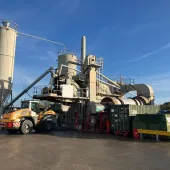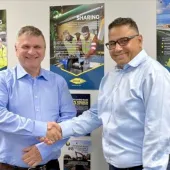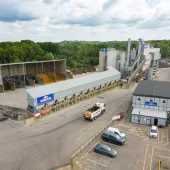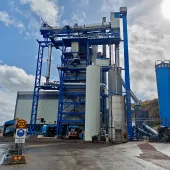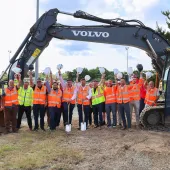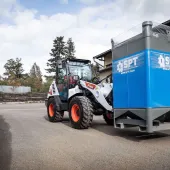Marini Asphalt Plant for Icelandic Runway Resurfacing Operation

First published in the January 2017 issue of Quarry Management as Icelandic Installation
Colas opt for new Marini XPRESS 2500 P mobile asphalt plant for runway surfacing operations at Keflavik International Airport
Iceland, an island with an overall surface area of 104,000km2 and only 333,000 inhabitants, is a complex terrain from a geological and morphological point of view. As well as four huge glaciers it also possesses 30 active volcanoes and witnesses considerable daily seismic activity.
Not surprisingly, the rock composition on Iceland is totally volcanic and therefore lacking in the ideal characteristics for use as aggregate in asphalt mixes. As a result, both aggregates and bitumen have to be imported into the country by sea, mainly from Norway.
Iceland’s road network has been shaped around the natural features of this difficult and constantly changing environment. Some 60% of the existing road system is not asphalted, 35% has a single surface treatment and only the remaining 5% consists of traditional hot-asphalt paving material.
It was against this background that, in the late 1980s, Colas – one of the most renowned names in road building worldwide – decided to establish an operational center in Iceland, which quickly became the market leader in asphalt production, sales and paving. Each year, Colas provide some 250,000 tonnes of the 350,000 tonnes of asphalt produced on the island.
In the second half of 2015, Colas Denmark, the division responsible for the company’s Icelandic operations, conducted a technical/commercial market survey aimed at pinpointing a new asphalt plant whose first task would be to resurface the main runway at Reykjavik-Keflavik Airport, before being put to use on other building and maintenance projects on the island.
Key features regarded as fundamental requirements for the new plant included: wheeled mobility for quick and easy transport; rapid, low-cost installation without the need for large lifting equipment; a capacity of more than 200 tonnes/h with sufficient storage to permit uninterrupted production; and high build quality, robustness and reliability to ensure continuous production, given the difficulties in servicing plant in Iceland in terms of both technical support and the supply of necessary spare parts.
According to Colas, the choice of a Marini XPRESS 2500 P mobile plant fully satisfied all initial expectations and requirements. The main components are transportable on individual wheel-mounted units, each with its own braking system to meet road transportation standards, and all remaining components are housed and transported in a single specially designed container. The plant is also self-erecting thanks to a hydraulic system which lifts the main trailer into its working position, while a small electric winch fitted to the main trailer is used to position the screens and elevator. Moreover, the plant provides the required 200-tonnes/h performance (with up to 5% moisture content in virgin aggregates) and is both structurally and mechanically strong.
In May last year the plant was officially handed over to Colas, thereby beginning its long journey to Reykjavik from Marini’s workshops in Alfonsine, via the Italian port of Ravenna, where it was loaded on to a ship bound for Iceland. Four weeks after leaving the factory, the plant reached its Icelandic destination where it underwent a further two week-period of installation and testing. The first task awaiting the newly erected and commissioned XPRESS 2500 P plant was the resurfacing of the main runway at Reykjavik-Keflavik Airport.
With Icelandic tourism increasing, the country requires adequate infrastructure. The international airport in Keflavik, some 50km from the capital, is not only easily reached from many parts of Europe, but is also a stopover destination for many international flights between America and Asia. The flow of passengers either visiting the country or in transit is increasing by around 20% per year.
The resurfacing of the main runway at Keflavik, as well as the future construction of a third runway and an additional airport hub, represents the creation of a great number of jobs and a considerable economic income for an island country that aims to be an integral and well-connected part of Europe. For more information visit: www.marini.fayat.com
- Subscribe to Quarry Management, the monthly journal for the mineral products industry, to read articles before they appear on Agg-Net.com


